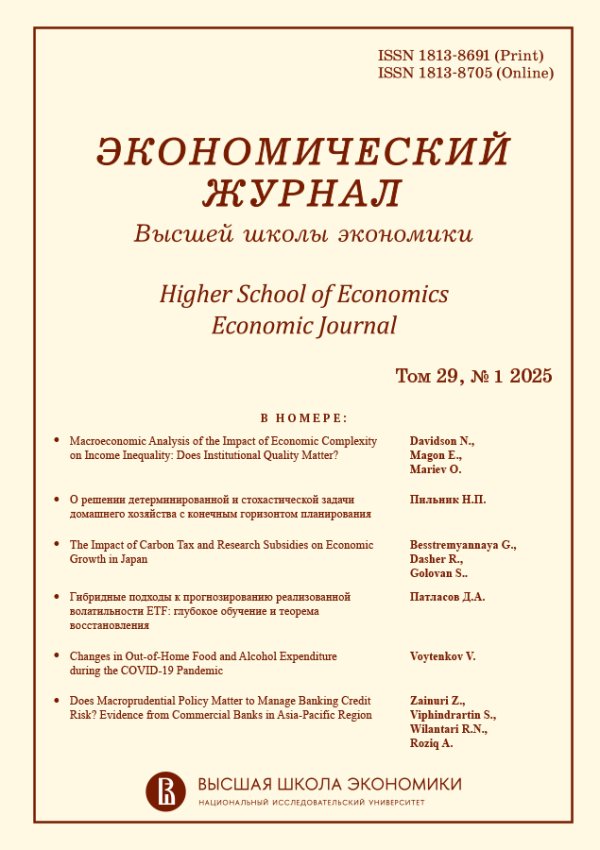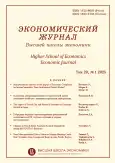Макроэкономический анализ влияния экономической сложности на неравенство доходов: Какова роль качества институтов?
- Авторы: Давидсон Н.Б.1, Магон Е.А.2, Мариев О.С.1
-
Учреждения:
- Институт экономики и управления, Уральский федеральный университет
- Институт экономики и управления, Уральский федеральный университет
- Выпуск: Том 29, № 1 (2025)
- Страницы: 9-41
- Раздел: Статьи
- URL: https://bakhtiniada.ru/1813-8691/article/view/287480
- DOI: https://doi.org/10.17323/1813-8691-2025-29-1-9-41
- ID: 287480
Цитировать
Полный текст
Аннотация
В статье рассматривается взаимосвязь между экономической сложностью и неравенством доходов с учетом роли институтов на основе данных за 1996–2020 гг. по 52 развитым и развивающимся странам Европы и Центральной Азии, а также Ближнего Востока и Северной Африки. Вклад исследования состоит, во-первых, в том, что проанализировано влияние экономической сложности на неравенство доходов с учетом качества институтов в целом и отдельных аспектов институционального развития. Во-вторых, учтена нелинейная форма зависимости между экономической сложностью и неравенством доходов, а также разнородность данной взаимосвязи для разных групп стран. Проблема эндогенности решена при помощи двухшагового метода наименьших квадратов с фиксированными эффектами и инструментальными переменными. Полученные результаты свидетельствуют о том, что для общей выборки стран рост экономической сложности в стране приводит к росту неравенства доходов. Вместе с тем влияние экономической сложности на неравенство варьируется по группам стран, а для стран Европы и Центральной Азии эта зависимость имеет форму перевернутой U. При этом в условиях развитости институтов экономическая сложность способствует снижению неравенства. Можно сделать вывод о том, что развитие всех аспектов институтов приводит к снижению неравенства доходов. Также результаты исследования свидетельствуют о том, что снижению уровня неравенства способствует развитие сферы образования. Кроме того, полученные результаты позволяют сделать вывод о необходимости экономической политики, способствующей более равномерному распределению выгод от экономического развития и международной торговли.
Об авторах
Наталья Борисовна Давидсон
Институт экономики и управления, Уральский федеральный университет
Email: natalya.davidson@gmail.com
К.э.н., доцент кафедры международной экономики и менеджмента
Россия, ЕкатеринбургЕкатерина Александровна Магон
Институт экономики и управления, Уральский федеральный университет
Email: Volkova2016consta@gmail.com
Студентка магистратуры
Россия, ЕкатеринбургОлег Святославович Мариев
Институт экономики и управления, Уральский федеральный университет
Автор, ответственный за переписку.
Email: o.s.mariev@urfu.ru
К.э.н., доцент, заведующий кафедрой экономики
Россия, ЕкатеринбургСписок литературы
- Acemoglu D., Egorov G., Sonin K. (2012) Dynamics and Stability of Constitutions, Coalitions, and Clubs. The American Economic Review, 102, 4, pp. 1446–1476. http://dx.doi.org/10.1257/aer.102.4.1446
- Acemoglu D., Johnson S., Robinson J.A. (2005) Institutions As a Fundamental Cause of Long-Run Growth. Handbook of Economic Growth 1(A) (eds. P. Aghion, S.N. Durlauf). Elsevier., pp 385–472. https://doi.org/10.1016/S1574-0684(05)01006-3
- Adão R., Carrillo P., Costinot A., Donaldson D., Pomeranz D. (2022) Imports, Exports, and Earnings Inequality: Measures of Exposure and Estimates of Incidence. The Quarterly Journal of Economics, 137, 3, pp. 1553–1614. https://doi.org/10.1093/qje/qjac012
- Alesina A., Rodrik D. (1994) Distributive Politics and Economic Growth. The Quarterly Journal of Economics, 109, 2, pp. 465–490. https://doi.org/10.2307/2118470
- Amarante V., Lanzilotta B., Torres J. (2023) Inequality and Productive Structure: New Evidence at the world Level. UNU-WIDER Working Paper, 2023/9. https://doi.org/10.35188/UNU-WIDER/2023/317-8
- Balland P.-A., Broekel T., Diodato D., Giuliani E., Hausmann R., O'Clery N., Rigby D. (2022) Reprint of the New Paradigm of Economic Complexity. Research Policy, 51, 8, pp. 104568. https://doi.org/10.1016/j.respol.2022.104568
- Baum C.F., Schaffer M.E., Stillman S. (2003) Instrumental Variables and GMM: Estimation and Testing. The Stata Journal, 3, 1, pp. 1–31. https://doi.org/10.1177/1536867X0300300101
- Berg A.G., Ostry J.D. (2013) Inequality and Unsustainable Growth: Two Sides of the Same Coin? In-ternational Organization Research Journal, 8, 4, pp. 77–99. http://dx.doi.org/10. 1057/s41308-017-0030-8
- Bergh A., Nilsson Th. (2010) Do Liberalization and Globalization Increase Income Inequality? Eu-ropean Journal of Political Economy, 26, 4, pp. 488–505. https://doi.org/10.1016/j.ejpoleco.2010.03.002
- Bernal P., Carree M., Lokshin B. (2022) Knowledge Spillovers, R&D Partnerships and Innovation Performance. Technovation, 115, pp. 102456. https://doi.org/10.1016/j.technovation.2022.102456
- Bollen K.A. (1989) Structural Equations with Latent Variables. New York: John Wiley and Sons, Inc. https://doi.org/10.1002/9781118619179
- Bustos S., Yıldırım M.A. (2022) Production Ability and Economic Growth. Research Policy, 51, 8, pp. 104153. https://doi.org/10.1016/j.respol.2020.104153
- Caldarelli G., Cristelli M., Gabrielli A., Pietronero L., Scala A., Tacchella A. (2012) A Network Anal-ysis of Countries’ Export Flows: Firm Grounds for the Building Blocks of the Economy. PLoS One, 7, 10. https://doi.org/10.1371/journal.pone.0047278
- Carvalho L., Rezai A. (2014) Personal Income Inequality and Aggregate Demand. Working Paper, 2014–23. Department of Economics, University of São Paulo. São Paulo.
- Chancel L., Piketty T., Saez E., Zucman G. et al. (2022) World Inequality Report. World Inequality Lab.
- Chávez J.C., Mosqueda M.T., Gómez-Zaldívar M. (2017) Economic Complexity and Regional Growth Performance: Evidence from the Mexican Economy. The Review of Regional Studies, 47, 2, pp. 201–219. https://doi.org/10.52324/001c.8023
- Chu L.K., Hoang D.P. (2020) How Does Economic Complexity Influence Income Inequality? New Evidence from International Data. Economic Analysis and Policy, 68(C), pp. 44–57. https://doi.org/10.1016/j.eap.2020.08.004
- Cingano F. (2014) Trends in Income Inequality and its Impact on Economic Growth. OECD Social, Employment and Migration Working Papers, 163. https://doi.org/10.1787/5jxrjncwxv6j-en
- Constantine C., Khemraj T. (2019) Geography, Economic Structures And Institutions: A Synthesis. Structural Change and Economic Dynamics, 51(C), pp. 371–379. https://doi.org/10.1016/j.strueco.2019.01.001
- Dorn D., Levell P. (2021) Trade and Inequality in Europe and the US. IZA Discussion Papers 14914, Institute of Labor Economics (IZA).
- Feldman M., Guy F., Iammarino S. (2021) Regional Income Disparities, Monopoly and Finance. Cambridge Journal of Regions, Economy and Society, 14, 1, pp. 25–49. https://doi.org/10.1093/cjres/rsaa024
- Foster E.M., McLanahan S. (1996) An Illustration of the Use of Instrumental Variables: Do Neigh-borhood Conditions Affect a Young Person's Chance of Finishing High School? Psychological Methods, 1, 3, pp. 249–260. https://doi.org/10.1037/1082-989X.1.3.249
- Gao X., Rai V. (2023) Knowledge Acquisition and Innovation Quality: The Moderating Role of Geo-graphical Characteristics of Technology. Technovation, 125, pp. 102766. https://doi.org/10.1016/j.technovation.2023.102766
- Gómez‐Zaldívar M., Osorio‐Caballero M.I., Saucedo‐Acosta E.J. (2022) Income Inequality and Eco-nomic Complexity: Evidence from Mexican States. Regional Science Policy & Practice, 6, 14, pp. 344–363. https://doi.org/10.1111/rsp3.12580
- Hartmann D. (2014) Economic Complexity and Human Development: How Economic Diversifica-tion and Social Networks Affect Human Agency and Welfare. New York: Routledge.
- Hartmann D., Guevara M.R., Jara-Figueroa C., Aristarán M., Hidalgo C.A. (2017) Linking Economic Complexity, Institutions, and Income Inequality. World Development, 93, pp. 75–93. https://doi.org/10.1016/j.worlddev.2016.12.020
- Hausmann R., Hidlago C.A., Bustos S., Coscia M., Chung S., Jimenez J., Simoes A., Yildirim M.A. (2011) The Atlas of Economic Complexity: Mapping Paths to Prosperity. Massachusetts: Puritan Press.
- Hidalgo C.A., Hausmann R. (2009) The Building Blocks of Economic Complexity. Proceedings of the National Academy of Science of the United States of America, 106, 26, pp. 10570–5. https://doi.org/10.1073/pnas.0900943106
- Kemp-Benedict E. (2014) An Interpretation and Critique of the Method of Reflections. MPRA Pa-per, 60705, pp. 1–16.
- Kumhof M., Rancière R., Winant P. (2015) Inequality, Leverage, and Crises. The American Econom-ic Review, 105, 3, pp. 1217–1245. http://dx.doi.org/10.1257/aer.20110683
- Kuznets S. (1955) Economic Growth and Income Inequality. The American Economic Review, 45, 1, pp. 1–28.
- Lakner C., Milanovic B. (2016) Global Income Distribution: From the Fall of the Berlin Wall to the Great Recession. The World Economic Review, 30, 2, pp. 203–232.
- Le Caous E., Huarng F. (2020) Economic Complexity and the Mediating Effects of Income Inequali-ty: Reaching Sustainable Development in Developing Countries. Sustainability, 12, 5, pp. 2089. https://doi.org/10.3390/su12052089
- Lee C.C., Wang E.Z. (2021) Economic Complexity and Income Inequality: Does Country Risk Mat-ter? Social Indicators Research, 154, pp. 35–60. https://doi.org/10.1007/s11205-020-02543-0
- Lee K.K., Vu T.V. (2020) Economic Complexity, Human Capital and Income Inequality: A Cross-Country Analysis. The Japanese Economic Review, 71, 4, pp. 695–718. https://doi.org/10.1007/s42973-019-00026-7
- Lessmann Ch., Seidel A. (2017) Regional Inequality, Convergence, and its Determinants – A View from outer Space. European Economic Review, 92(C), pp. 110–132. https://doi.org/10.1016/j.euroecorev.2016.11.009
- Malla M.H., Pathranarakul P. (2022) Fiscal Policy and Income Inequality: The Critical Role of Insti-tutional Capacity. Economies, 10, 5, pp. 115. https://doi.org/10.3390/economies10050115
- Maydeu-Olivares A., Shi D., Fairchild A.J. (2020) Estimating Causal Effects in Linear Regression Mo dels with Observational Data: The Instrumental Variables Regression Model. Psychological Methods, 25, 2, pp. 243–258. https://doi.org/10.1037/met0000226
- Mihályi P., Szelényi I. (2019) The Place of Rent-Seeking and Corruption in Varieties of Capitalism Models. Market Liberalism and Economic Patriotism in the Capitalist World-System (eds. T. Gerőcs, M. Szanyi) International Political Economy Series, Palgrave Macmillan, Cham, pp. 67–97. https://doi.org/10.1007/978-3-030-05186-0_5
- Morais B.M., Swart J., Jordaan J.A. (2021) Economic Complexity and Inequality: Does Regional Productive Structure Affect Income Inequality in Brazilian States? Sustainability, 13, 2, pp. 1–23. https://doi.org/10.3390/su13021006
- Nguyen C.P., Nguyen B.Q., Le Tran D.T. (2023) Economic Complexity and Income Inequality: New Evidence of a Nonlinear Effect. Social Science Quarterly, 104, 4, pp. 829–868. https://doi.org/10.1111/ssqu.13281
- Nolan B., Richiardi M.G., Valenzuela L. (2019) The Drivers of Income Inequality in Rich Countries. Journal of Economic Surveys, 33, 4, pp. 1285–1324.
- Ouechtati I. (2023) Financial Inclusion, Institutional Quality, and Inequality: An Empirical Analy-sis. Journal of the Knowledge Economy, 14, 2, pp. 620–644. https://doi.org/10.1007/s13132-022-00909-y
- Oyèkọ́lá Ọ. (2023) Life May be unfair, but Do Democracies Make it Any Less Burdensome? The Journal of Economic Inequality. https://doi.org/10.1007/s10888-023-09607-4
- Pham M.H., Truong H.D.H., Hoang D.P. (2023) Economic Complexity, Shadow Economy, and In-come Inequality: Fresh Evidence from Panel Data. Research Square. https://doi.org/10.21203/rs.3.rs-2452093/v1
- Piketty T., Goldhammer A. (2014) Capital in the Twenty-First Century. Harvard University Press.
- Rajan R.G. (2010) Fault Lines: How Hidden Fractures Still Threaten the world Economy. Princeton: Princeton University Press.
- Rikap C., Lundvall B.-A. (2020) Big Tech, Knowledge Predation and the Implications for Develop-ment. Innovation and Development, 12, 3, pp. 389–416. https://doi.org/10.1080/2157930X.2020.1855825
- Sbardella A., Pugliese E., Pietronero L. (2017) Economic Development and Wage Inequality: A Complex System Analysis. PLOS ONE, 12, 9, pp. e0182774. https://doi.org/10.1371/journal.pone.0182774
- Sepehrdoust H., Tartar M., Gholizadeh A. (2021) Economic Complexity, Scientific Productivity and Income Inequality in Developing Economies. Economics of Transition and Institutional Change, 30, 4, pp. 737–752. https://doi.org/10.1111/ecot.12309
- Schaffer M.E. (2010) xtivreg2: Stata Module to Perform Extended IV/2SLS, GMM and AC/HAC, LIML and k-class Regression for Panel Data Models. http://ideas.repec.org/c/boc/bocode/s456501.html
- Solt F. (2020) Measuring Income Inequality Across Countries and Over Time: The Standardized World Income Inequality Database. Social Science Quarterly, 101(3), 1183–1199. https://doi.org/10.1111/SSQU.12795
- Stolper W.F., Samuelson P.A. (1941) Protection and Real Wages. The Review of Economic Studies, 9, 1, pp. 58–73. https://doi.org/10.2307/2967638
- Tacchella A., Cristelli M., Caldarelli G., Gabrielli A., Pietronero L. (2012) A New Metrics for Coun-tries’ Fitness and Products’ Complexity. Scientific Reports, 2, 1, pp. 723. https://doi.org/10.1038/srep00723
- Topuz S.G. (2022) The Relationship between Income Inequality and Economic Growth: Are Trans mission Channels Effective? Social Indicators Research, 162, pp. 1177–1231. https://doi.org/10.1007/s11205-022-02882-0
- Violante G.L. (2008) Skill-Biased Technical Change. The New Palgrave Dictionary of Economics. London: Palgrave Macmillan. https://doi.org/10.1057/978-1-349-95121-5_2388-1
- Vu T. (2022) Does Institutional Quality Foster Economic Complexity? The Fundamental Drivers of Productive Capabilities. Empirical Economics, 63, pp. 1571–1604. https://doi.org/10.1007/s00181-021-02175-4
- World Bank (2022) Worldwide Governance Indicators. https://info.worldbank.org/governance/wgi/
- Zhu S., Yu C., He C. (2020) Export Structures, Income Inequality and Urban-Rural Divide in China. Applied Geography, 115, pp. 102150. https://doi.org/10.1016/j.apgeog.2020.102150
- Zhu Ch. (2022) Conceptualising and Evaluating Inclusive Economic Development: A Productivity Perspective. Development Studies Research, 9, 1, pp. 219–229. https://doi.org/10.1080/21665095.2022.2112729
Дополнительные файлы










